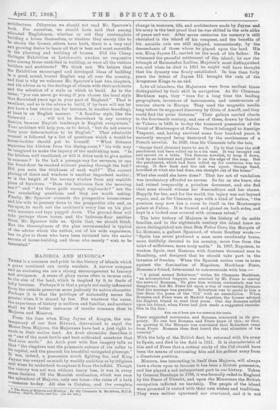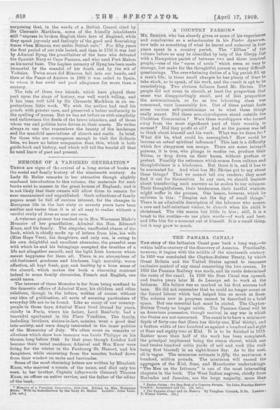MAJORCA AND MINORCA.*
THERE is a romance and pride in the history of islands which a. grave continent can rarely emulate. A narrow compass and an enclosing sea are a strong encouragement to bravery and arrogance. A sense of glory varies often in inverse ratio to the size of the land, which is inspired by it to deeds of lefty heroism. Perhaps it is that a people not easily influenced from the outside preserves more jealously its native character. Perhaps it is that the privilege of nationality seems the greater when it is shared by few. But whatever the cause, the experience of history is uniform and familiar, and nowhere' shall we find better instances of insular romance than in Majorca and Minorca.
Prom the time when King Jayme of Aragon, the con- temporary of our first Edward, determined to expel the Moors from Majorca, the Majorcane have had a just right to exult in their native land. An Arab chronicler describes it as "one of the most fertile and best cultivated countries that God ever made." An Arab poet with fine imagery tells us that "the ringdove lent the prismatic colours of his collar to its capital, and the peacock his beautiful variegated plumage." It was, indeed, a possession worth fighting for, and King jayine was swayed as much by worldly ambition as by religious zeal when he undertook to capture it from the infidel. Though the victory was not won without heavy loss, it was in every aense decisive. Of the Moorish civilisation, which was once the splendour of Majorca, only one trace—the ruins of a bath —remains to-day. All else is Catalan, and the complete The Story of Majorca and Minorca. Dy Sir Clemente R. Markham, E.C.D. London : Smith, Elder, and Co. [78. ad. net.]
change in manners, life, and architecture made by ■Tayme and his army is the hest proof that he was skilled in the arts alike of peace and war. After seven centuries his memory is still cherished in the island of his conquest, and the benefits of his amiable rule are still enjoyed, unconsciously, by the descendants of those whom he placed upon the land. His son, King Jayme II., carried on the work of his father. He witnessed the peaceful settlement of the island; he saw the triumph of Raimundus Lulling, Majorca's most distinguished son, and when he died in 1311 he might well have thought that his dynasty was firmly established. In leas than forty years the defeat of Jayme III. brought the rule of the Aragonese Kings to an end.
Like all islanders, the Majorcans were from earliest times distinguished by their skill in navigation. As Sir Clements Markham says, they "were for a long time the leading geographers, inventors of instruments, and constructors of marine charts in Europe. They used the magnetic needle long before its supposed discovery by Gioia. of Amalfi, and they could find the polar distance." Their galleys carried charts in the fourteenth century, and one of these, drawn by Gabriel de Valseca in 1439, is to-day the treasured possession of the Count of Montenegro at Palma. Once it belonged to Amerigo Vespucci, and, having survived some four hundred years, it narrowly escaped being destroyed by the carelessness of a French novelist. In 1839, thus Sir Clements tells the tale,
"George Sand obtained leave to see it. Up to that time the stiff parchment had been rolled up in a tin ease. It was brought out and spread on a table. The famous novelist, to keep it down, took up An inkstand and placed it on the edge of the map. But the parchment, which had been rolled up for centuries, was too strong. It flew back and the ink was upset. George Sand, horrified at what she had done, ran straight out of the house."
What else could she have done? That her act of vandalism was involuntary afforded no excuse. So far as she knew, she had ruined irreparably a priceless document, and she fled that none should witness her discomfiture and her shame. Happily for her, and for the world, the injury was not beyond repair, and, as Sir Clements says with a kind of bathos, "the precious map now has a room to itself in the Montenegro palace at Palma. It is framed and glazed on both sides, and kept in a locked case covered with crimson velvet."
The later history of Majorca is the history of its noble families, and in the eighteenth century the island knew no more distinguished son than Don Pedro Caro, the Marquis of La Romann, a gallant Spaniard, of whom Southey wrote :— "Spain has never produced a man more excellently brave, more dutifully devoted to his country, more free from the taint of selfishness, more truly noble." In 1807, Napoleon, to weaken Spain, sent Roraima, with fourteen thousand men to Hamburg, and designed that he should take part in the invasion of Sweden. When the Spanish nation rose in arms against the domination of Napoleon, Hookbam Frere, Roinana's friend, determined to communicate with him :— " A priest named Robertson," writes Sir Clements Markham, "an accomplished linguist, was selected by Mr. Frere to convey the news to Romani'. To give him written credentials was too dangerous; but Mr. Frere hit upon a way of convincing Romany' that the message was genuine. Robertson was to quote to him a line from the poem of the 'Cid' with an emendation. When Romans and Freya were at Madrid together, the former advised his English friend to read that poem. One day Romana called upon his friend, when Frere had just made a suggested emenda- tion in the line : Ann vea el horn quo vos memoa dos tanto.
Frere suggested mereceades, and Romana concurred in its pro- priety. No one but Romana and Frere knew of this ; so that, on quoting it, the Marquis was convinced that Robertson came from Frere. Romana then first heard the real situation of his country."
With the help of the British fleet, he returned with his army to Spain, and died in the field in 1811. It is characteristic of him and of Frere that a critical study of the Cid should have been the means of extricating him and his gallant army from
a disastrous position. Minorca, less interesting in itself than Majorca, will always have a claim upon us because it has been is British possession, and has played a not unimportant part in our history. Taken by General Stanhope in 1708, it was formally ceded to England by the Peace of Utrecht, and upon the Minorcans the British occupation inflicted no hardship. The people of the island were governed in accord with their own wishes and traditions. They were neither oppressed nor overtaxed, and it is not
surprising that, in the words of a British Consul cited by Sir Piemonte Markham, some of the friendly inhabitants still "express in broken English their love of England, while, they speak joyously and feelingly ef the good and flourishing times when Minorca was under British rule." For fifty years the first period of our rule lasted, and then in 1756 it was lost by Admiral Byug, the grandfather of the hero who defeated the Spanish Navy at Cape Passaro, and who used Port Mahon as his naval base. The hapless memory of Byng hae been made immortal by the scandal of his death and by the wit of Voltaire. Twice more did Minorca fall into our bands, and then at the Peace of Amiens in 1802 it was ceded to Spain, to whom it has owed and paid allegiance for more than a century.
The tale of these two islands, which have played their part upon the stage of history, was well worth telling, and it hits been well told by Sir Cleiuents Markham in an un- pretentious little work. We wish the author had read his proofs with greater care, and preserved a better uniformity in the spelling of names. But he has set before us with simplicity and enthusiasm the deeds of the brave islanders, and of those whom war and politics have driven to their coasts. He writes always as one who remembers the beauty of the landscape and the manifold associations of church and castle. In brief, for those wh are courageous enough to visit the 13aleario Isles, we know no better companion than this, which is both guide-book and history, and which will tell the tourist all that
he need know of past and present.. •







































 Previous page
Previous page